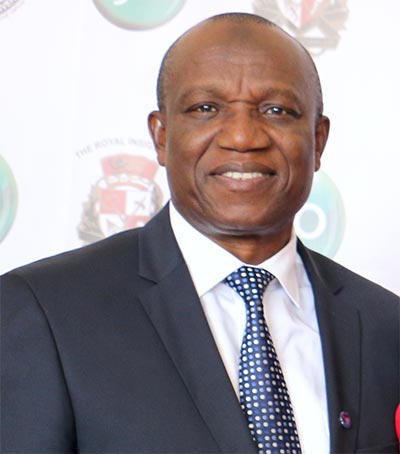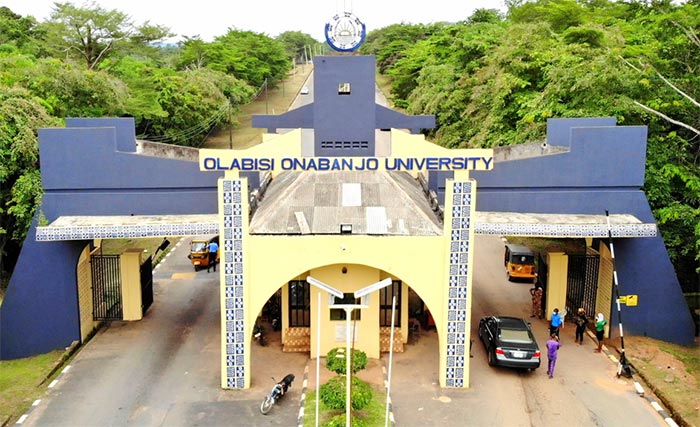The pioneering role of Olabisi Onabanjo University (OOU), Ago-Iwoye in tertiary education development came into focus recently as Ogun State marked the 45th anniversary of the creation of the state. The State Governor, Prince Dapo Abiodun, specifically acknowledged the University in a special broadcast delivered on February 3, 2021, where he appreciated the contributions of founding fathers whose efforts culminated in the state’s creation.
The state was created on February 3, 1976 after it was carved out of the old Western State of Nigeria during the military era and named after the Ogun River which runs across it from north to south.
Since its formation, Ogun State has come a long way and grown from humble beginning to become one of the most viable states in Nigeria. The state has also become the nation’s education capital, having so far recorded the highest number of Universities and higher institutions of learning in the country with a total of 26 tertiary institutions. Of course, OOU played a pivotal role in this phenomenal growth as attested to by Governor Abiodun in his recent state-wide broadcast.
“With a humble beginning in 1976,” he noted, “our dear State has grown to become one of the most viable states in Nigeria. We have grown our internally generated revenue to become the first among states created at the same time with us.”
The governor added: “We are the fastest growing investment and commercial destination not only in Nigeria, but in the entire West African sub-region, attracting one of the highest Foreign Direct Investments (FDI) and local investments.”
“With only one University in 1982; the then Ogun State University, now Olabisi Onabanjo University (OOU), Ago-Iwoye, having just over 500 students, we have grown to become the education capital of Nigeria with 26 tertiary institutions. OOU alone now has over 50,000 students, offering graduate and post graduate courses in different fields of human endeavours.”
In the true sense of the word, OOU is a leading light among tertiary institutions in the country. The University has produced a bulk of icons, administrators, business moguls, legal luminaries, notable educationists, literary giants, prominent entertainers as well as social and civil actors and its potentials continue to attract, develop and nurture people from diverse backgrounds, irrespective of age, gender, status and religion.
On July 7, 1982, the University was founded as Ogun State University (OSU). But on January 31, 1983, the University made history and opened its doors to its first set of students; the foundation students were a little over 500. The University was conceived as a multi-campus institution with the Main Campus in Ago-Iwoye, and others in Sagamu, Ayetoro and Ibogun.
The Main Campus in Ago-Iwoye, Ijebu Division, hosts Management, Law, Arts, Sciences, Education and Social Sciences programmes. Sagamu, in the Remo Division, houses the College of Health Sciences and Faculty of Pharmacy.
In Ayetoro, Yewa Division, lies the College of Agricultural Sciences with hundreds of hectares of land while the Ibogun Campus in Egba Division houses the College of Engineering and Environmental Studies of the University.
The institution that started with little over 500 students has grown in leaps and bounds and now has thousands of students in full time, part-time and postgraduate programmes with three Colleges, 13 Faculties, 53 Departments and 72 academic programmes.

Vice-Chancellor
In 1995, the University was moved from the Mini Campus to its permanent site (Main Campus). This movement was facilitated with a donation of N5m by the state government which also constructed about 10km road network (both access and internal) in the University.
On May 29, 2001, the University was renamed Olabisi Onabanjo University in honour of Chief (Dr.) Olabisi Onabanjo, whose efforts as the then Civilian Governor of Ogun State gave birth to the institution. Onabanjo, now late, was in office between 1979 and 1983.
According to the Vice-Chancellor, Professor Ganiyu Olatunji Olatunde, the University has successfully evolved with various academic programmes, research activities and services to the society which have catalysed its growth and development. Many of the University products have held and are still holding key leadership positions in both government and the organised private sector.
Speaking further, the Vice-Chancellor explained that in line with its mission to provide the best educational experience for students and the public, the University had since been restructured and reorganised, both physically and structurally into a true and working citadel of learning. Financial regulation and staff code of conduct were also instituted to address the issue of probity, accountability and usage of funds in the system. Staff welfare was also optimized with regular payment of salaries and emoluments as well as promotion as and when due.
Over the years, there have also been improvement in library resources with subscriptions/interphase with renowned virtual libraries such as E-library database, the MIT, cloud hosting of the library database and Stand-Alone e-book collections in addition to good collections of books and journals for the various academic programmes.
Without mincing words, the emergence of the current Vice-Chancellor further accelerated the pace of development in the University. It is noteworthy that various Chapters of the University Alumni Association, home and abroad, have keyed into and identified with the developmental agenda of the current Management by donating teaching and office equipment, including smart boards, computers, projectors, printers, fans and chairs for the use of the institution. Some have also donated physical structures to complement those put in place by the University Management.
The contributions of the University to tertiary education development in Ogun State continues to manifest under the leadership of Prof. Olatunde. New frontiers are being opened as OOU became the first state University to give online lectures and the first public University to conduct online examinations using Artificial Intelligence.
A lot has been achieved in the area of infrastructural development with the construction of lecture theatres, halls, rooms and seminar/conference rooms as well as lavatories for students. Completion of administrative and office blocks for the Central Administration, Colleges and Faculties was also achieved.
Under the Olatunde-led administration, technological self-sufficiency has been adopted as a core tenet of institutional development. The novel achievements in this area, according to the Ag. Director, ICT, Mr Ayodimeji Osinubosi, are improved information and communication technology resources to enable the University improve on webometric ranking, deployment of Fiber-Optics to improve internet connectivity, increase in bandwidth capacity to STEM 2 and use of Artificial Intelligence for the conduct of online screening tests for prospective University candidates. Significant improvement in landscaping has also been recorded with the establishment of an Environmental Management Unit specifically for the management of the lawns and aesthetic of the University.

On admissions, the University has improved tremendously by adhering to National Universities Commission (NUC) approved admission quota through the streamlining of candidates admitted to each programme/department to a maximum of 100 per session. Apart from strict compliance with admission requirements for both UTME and Direct Entry, OOU has improved in the quality of students admitted as reflected in the cut-off points with which freshers are enrolled into the various programmes.
Speaking in this regard, the Director of Quality Assurance, Professor Kola Odunaike, said the University was intensifying efforts to ensure its products are packaged for future development and challenges.
He said, “Olabisi Onabanjo University has always been following the guidelines of NUC, particularly the benchmark, and we are even doing more to ensure that our students are really packaged for future development. That is what the NUC people are really admiring, that we are able to package our students for future challenges.
Our students have been doing very well. If you look at the population of staff in the University, you will see that many of the alumni have been heading departments. Though, our population is almost increasing, but we adhere strictly to the benchmark of NUC.”
Moreover, the University has taken the lead by streamlining registration processes, removing all the bottlenecks and enhancing the integrity of the online records. Examinations are now conducted in a more conducive atmosphere through proper allocation of the lecture theatres, halls and rooms and with employment of e-resources/platforms for large classes. Also, results are released within two weeks of administering the examinations.
Part of the significant reforms by the University is on transcripts and certificates. Transcripts are now booked online and the turnaround only takes between 24 and 72 hours. A former student of the University, Tayo Adesipe, hailed the Management for the ongoing reforms in the institution, saying it has enhanced the corporate image of the University.
The University Management has also been working assiduously to surmount the challenges of missing results that sometime cause delay in the processing of transcripts and has been getting cheering results in this regard. Adesipe further applauded OOU for sustaining the culture of issuance of certificates at the time of graduation.
When the current administration of Prof. Olatunde came on board, the University accreditation status stood at 76 percent. But through purposeful leadership exemplified by great commitment to proper re-engineering and consolidation, the present Management has been able to get more programmes accredited, bringing the accreditation status to an impressive 97.2 percent.
Furthermore, the Management has ensured that no stone is left unturned in fostering cordial relationship with the host communities of the University campuses with the use of its Town and Gown Committee as a formidable tool. Burning issues are usually resolved at the committee meetings. The Ebumawe of Ago-Iwoye, Oba Abdulrazaq Adenugba, expressed satisfaction with how the committee had continued to handle its assignment. The monarch stressed the need to sustain the town and gown relationship.
In managing the affairs of the University, the Vice-Chancellor has left no one in doubt of his commitment to ensuring OOU becomes a world-class by all standards and compete favourably in a global knowledge economy. Under Prof. Olatunde, there has been greater commitment to staff acquisition of higher degrees at Masters and Doctoral levels through full sponsorships of eligible staff mainly with the support of Tertiary Education Trust Fund (TETFund) and Needs Assessment Interventions in Academic Staff Training and Development. The non-teaching staff are not left out in the robust training programmes as many have enjoyed sponsorship to local and foreign conferences, trainings and workshops.
The foregoing and many other legendary strides, in the estimation of several industry observers, experts and stakeholders might have informed the remarks by Governor Dapo Abiodun singling out OOU in his state’s anniversary broadcast. In the 39 years of existence of the University, so far, the state government as the Proprietor has been a blessing to the flagship institution and the relationship is expected to blossom and get more cordial in years to come.

